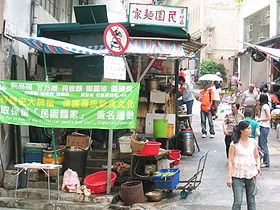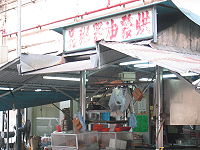- Dai pai dong
-
This article is about a kind of food stall in Hong Kong. For the Hong Kong-based food chain store, see Dai Pai Dong.
Dai pai dong 
Man Yuen Noodles, a former dai pai dong on Elgin Street, Central. The Democratic Party banner calls for preservation of the stall. Traditional Chinese 大牌檔 Simplified Chinese 大牌档 Literal meaning Big Plate Stalls Transcriptions Mandarin - Hanyu Pinyin dà pái dàng Cantonese (Yue) - Jyutping daai6 paai4 dong3 Cooked-food stalls Traditional Chinese 大排檔 Simplified Chinese 大排档 Literal meaning large-row stalls Transcriptions Mandarin - Hanyu Pinyin dà pái dàng Cantonese (Yue) - Jyutping daai6 paai4 dong3 Dai pai dong is a type of open-air food stall once very popular in Hong Kong. The government registration name in Hong Kong is "cooked-food stalls", but dai pai dong literally means "restaurant with a big license plate", referring to its size of license which is bigger than other licensed street vendors.[1]
Contents
Characteristics
A dai pai dong is characterised by its green-painted steel kitchen, untidy atmosphere, the lack of air conditioning, as well as a variety of low priced great-wok hei dishes. Regarded by some as part of the collective memory of Hong Kong people,[2] official dai pai dong are scarce today, numbering only 28, situated in Central (10), Sham Shui Po (14), Wan Chai (1), Tai Hang (2), and Tai O (1).[3][4]
Although the term dai pai dong is often used generically to refer to any food stall operating on the roadside with foldable tables, chairs and no air-conditioning (like those on Temple Street), legally speaking the term can only refer to those 28 stalls which possess the "big licenses".[citation needed]
History
Unlicensed food stalls, which provided cheap everyday food such as congee, rice and noodles to the general public of humble income, appeared in as early as the late 19th century in Hong Kong. The stalls could be found not only in Central, but also in Wanchai and the peripheries of Happy Valley Racecourse around Wong Nai Chung Road. In fact, the great fire at the racecourse in 1918 was caused by food stalls set beside the podium.[5] There were also stalls assembled by piers, which formed the so-called Waisik Matau (為食碼頭 lit. "Gluttonous Pier"), to serve ferry passengers.
After World War II came to an end in 1945, the colonial Hong Kong government issued ad hoc licenses to families of deceased and injured civil servants, allowing them to operate food stalls in public and thereby earn a living. This kind of license was considerably larger than the ones normally issued, as a photograph of the licensee was required to appear on them. The license, therefore, was jocularly called "dai pai" (big license) by the locals. From then on, the "big license stalls" began to flourish on every busy street and lane in Hong Kong.
However, dai pai dong soon became the cause of traffic congestion and hygiene problems, and some licensees even began to let out their stalls on the black market. In response, the government stopped issuing new "big licenses" in 1956, and limited their transfer. The licenses could no longer be inherited, and could only be passed on to spouses upon the licensee's death. If the licensee did not have a spouse, the license would simply expire.
Since 1975, many dai pai dong have been moved into temporary markets, like the ones on Haiphong Road, Tsim Sha Tsui, or into cooked food centres, usually located in municipal services complexes managed by the Urban Council, for easier control. In order to improve worsening public hygiene, the government began to buy back "big licences" from the licence-holders in 1983. Since most of the licensees were aged, and the licenses are only legally transferable to their spouses, many of the licensees were willing to return their licenses for compensation. Since then, the number of traditional dai pai dong has declined rapidly.
Today, most dai pai dong survive by operating in cooked food centres, while the more successful ones have reinvented themselves as air-conditioned restaurants (some of them keep their original stalls operating at the same time, like Lan Fong Yuen (蘭芳園) in Gage Street, Central).
It was reported that revenues of dai pai dong increased considerably in 2003 when Hong Kong was plagued by SARS; as people regarded air-conditioned places as hotbeds of the virus and patronised open-air and sun-lit stalls instead.[6]
Features
- One can order tailor-made dishes.
- It is customary to have to share tables with complete strangers when there is a shortage of seating.
- Unlike cha chaan teng, most dai pai dong do not provide set meals.
- "Cross-stall ordering" is possible: for instance, when one is sitting and eating in a stall selling noodles, he or she can order a cup of milk tea from another stall, which may be several stalls away.
- The stalls can be roughly divided into those operating in daytime and those doing business at night. The dai pai dong which operate at night usually sell seafood and other more costly dishes: one dish usually costs from HKD$ 40-70. The day-time dai pai dong, on the contrary, provide cheap food including:
- Congee and youtiao (aka yau cha kwai);
- Milk tea, toasts, sandwiches and instant noodles with ham, egg, luncheon meat or sausage;
- rice or noodles with siu mei (燒味 roasted meats);
- fried rice and dip tau fan (碟頭飯 rice plates);
- Chiuchow-style noodles (潮州粉麵).
Preservation
In May 2005, the existence of dai pai dong in Hong Kong caught considerable public attention, as Man Yuen Noodles, a dai pai dong selling noodles in Central, faced imminent closure due to the death of the licensee. The news came after the closure of a bakery notable for its egg tarts, also located in Central and forced to close because of the rise of rent. The bakery reopened in October 2005.[7]
Despite calls for its preservation by many locals, including some politicians, the stall was closed on July 30, 2005. The Hong Kong government was criticised for not trying its best to preserve dai pai dong as part of the Hong Kong culture. The news of the closure coincided with the government's proposal of the development of West Kowloon Cultural District. The stall has unexpectedly reopened at a nearby shop on December 1, 2005.[8]
See also
References
- Cheng Po Hung (2003). Early Hong Kong Eateries. Hong Kong: University Museum and Art Gallery, the University of Hong Kong.
- Ng Ka Wing Karen, Wong Lai Wah and Yiu Shuk Hing. From the Streets to the Shopping Arcades - Dai Pai Dong Culture in Hong Kong, paper issued by the Creative Learning and Hong Kong Culture and Society Project (CLHKCSP).
Notes
- ^ Lai, Lawrence Wai-chung (2003). Town Planning in Hong Kong: A Review of Planning Appeal Decisions, 1997-2001. Hong Kong: Hong Kong University Press; London: Eurospan. ISBN 962-209-660-3.
- ^ (Chinese) 有議員擔心大牌檔文化絕跡, RTHK, 23-11-2005.
- ^ (Chinese) 立法會:「大牌檔文化承傳政策」動議辯論發言全文, HKSAR Government, 23-11-2005.
- ^ (Chinese) 香港仅存的大排檔, 香港旅游网.
- ^ Lai, Kam-biu, Bill, "Policy analysis and policy windows: fire fighting policy in Hong Kong", Appendix V, University of Hong Kong, 1999
- ^ Ming Pao, A6, 31-07-2005.
- ^ (Chinese) 泰昌復業 買撻人龍再現, Sina.com, 01-10-2005.
- ^ (Chinese) 民園麵家又迫遷?, Apple Daily, 10-10-2006.
External links
- 大排檔活化工程| Rejuvenation of Cooked Food Stall Website about Wong Tai Sin's cooked food stall(黃大仙冬菇亭).
- List of Dai Pai Dongs in Hong Kong
- (Chinese) 28夕陽大牌檔 世紀街頭巷戰, Apple Daily, 06-09-2006.
- A picture of Man Yuen Noodles, Apple Daily, 26-07-2005.
- HONG KONG DAIPAIDONG: What's for lunch?, video and text.
- Short documentary video about the dai pai dong along the escalator in Central. Video was shot shortly before the destruction of the Dai Pai Dong in August 2010.
Categories:- Cantonese words and phrases
- Hong Kong cuisine
- Types of restaurants
Wikimedia Foundation. 2010.


